





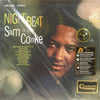
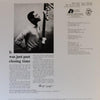
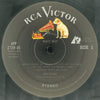
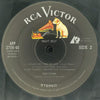
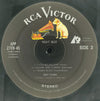
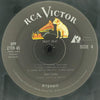
Sam Cooke – Night Beat (2LP, 45RPM)
Vocals - Sam Cooke [click here to see more vinyl featuring Sam Cooke]
Guitar - René Hall , Clifton White, Barney Kessel
Bass guitar - Cliff Hils
Drums, tambourine - Sharky Hall
Drums - Hal Blaine
Piano - Ray Johnson
Organ - Billy Preston
All songs conducted by René Hall
Written James Alexander (A2), Lowell Jordan (A2), Charles Brown (B1, C3), Jesse Ervin (B1), Ella Tate (B2), Frank Haywood (B3), Ernest Tucker (B3), Chester Burnett (C1), Willie Dixon (C1), Sam Cooke (C2, D1), Mississippi Fred McDowell (D1), Mabel Cordle (D2), Jerry Fuller (D2), Robert Geddins (D2), Charles E. Calhoun (D3)
A1, A3 are traditional songs arranged by Sam Cooke
2LPs, standard sleeve
Original analog Master tape : YES
Heavy Press : 180g
Record color : Black
Speed : 45 RPM
Size : 12'’
Stereo
Studio
Record Press : Quality Record Pressings
Label : Analogue Productions
Original Label : RCA Victor
Recorded on February 22–23, 25 1963 in RCA Victor's Music Center of the World, Hollywood, California
Engineered by Dave Hassinger
Produced by Hugo & Luigi
Mastered by George Marino at Sterling Sound from the original three-track masters
Liner Notes by Hugo & Luigi
Originally released in August 1963
Reissued in 2020
Tracks:
Side A:
- Nobody Knows the Trouble I've Seen
- Lost and Lookin'
- Mean Old World
Side B:
- Please Don't Drive Me Away
- I Lost Everything
- Get Yourself a Another Fool
Side C:
- Little Red Rooster
- Laughin' and Clownin'
- Trouble Blues
Side D:
- You Gotta Move
- Fool's Paradise
- Shake Rattle and Roll
Awards:
TAS Super LP List! Special Merit: Informal
Reviews :
“Whenever I think of Night Beat, I wonder how many records as perfect have been made since 1963. Listen anew to Sam Cooke's vocal honey on this Soul Blues album and I doubt you will come up with any worthy contenders...This 45 RPM issue was remastered at Sterling Sound and brings out the backing musicians including organist Billy Preston and guitarist Barney Kessel better than the ABKCO release, and makes it sound more like Sam was in the same room with the band. The definitive Night Beat.” Reuben Parry, Hi-Fi+
“The consistency of the album's mood and tone is remarkable as is the unerring correctness of Cooke's phrasing and the way he shapes vocal colors and textures. Cooke had a wide range of unique vocal trademarks that others copied, including one particular 'woaha woaha woo' you'll recognize. Listen to Rod Stewart after playing this. Cooke's soul seems to reside in Stewart.” Michael Fremer, www.musicangle.com
"Saddled with soaring strings and vocal choruses for maximum crossover potential, Sam Cooke's solo material often masked the most important part of his genius -- his glorious voice -- so the odd small-group date earns a special recommendation in his discography. Thankfully, Cooke's voice took center stage on this admirably low-key session from February 1963, recorded in Los Angeles with a quartet of studio veterans. Unlike so many session crews and producers of the time, these musicians gave him plenty of space and often simply framed Cooke's breathtaking vocals. (On one of the best tracks here, "Lost and Lookin'," he's barely accompanied at all; only bass and cymbals can be heard far in the background.) The results are wonderful -- except for his early Soul Stirrers sides, Night Beat is the best place to marvel at one of the two or three best voices of the century. The songs are intimate blues, most taken at the pace of a late-night stroll, but despite the dark shading and heart-rending tempos, Cooke's voice is so transcendent it's difficult to become depressed while listening. Cooke also wrote three of the songs, including the excellent "Mean Old World," and rendered the traditional "Nobody Knows the Trouble I've Seen" practically unfamiliar with his own re-arrangement. Cooke also stretches out on a pair of jump blues classics, "Little Red Rooster" and "Shake, Rattle and Roll," summoning some honest grit for the former and putting the uptown swing into the latter. He also allows some solo space, from Barney Kessel's simple, unadorned solo on "Get Yourself Another Fool" to Billy Preston's playful organ vocalizing on "Little Red Rooster." If Sam Cooke had lived longer, there would've been several more sessions like this, but Night Beat is an even richer treasure for its rarity." AllMusic review by John Bush
"Back in the late fifties, when I was in grade school, my mom gave me a table radio that I promptly ensconced by my bed. Every night I listened to it—to the late-night programming on the pop station WSAI—only instead of making me sleepy, the music woke me up.
Cincinnati was still, effectively, a segregated town back then—most American cities were—but the late-night radio waves of WSAI were something else entirely. While AM stations devoted endless hours to the soul-killing harmonies of The Four Freshman, the Lennon Sisters, the Johnny Mann Singers, for a few hours each night WSAI turned off the spigot of pabulum and turned on what—to my nine-year-old ears—was a fire hose of excitement.
There were Elvis and Jerry Lee, of course. But there was also—and this was what was so excitingly new—a taste of the music that Elvis and Jerry Lee got their beat and bearings from. For the first time, I heard black singers who weren’t Ed Sullivan Show staples. I heard the Silhouettes’ funny “Get a Job,” Chuck Berry’s ecstatic “Sweet Little Sixteen,” The Chordettes’ delicious “Lollipop,” The Drifters’ lilting “There Goes My Baby.”
As the fifties edged into the sixties, the music just kept getting more danceable, more energizing, more varied, filled with a sexuality already implicit in “Sweet Little Sixteen” and “Lollipop,” mixed with gospel, doo-wop, blues, rock ’n’ roll, and r&b. It was music that would branch out in many directions, from Motown girl groups to Hendrix jazz-rock to Clinton funk to Booker T r&b and, above all else, to soul—to Aretha, Sam and Dave, Otis, Marvin Gaye.
But before there was a category called “soul,” before there were any of these vital things, there was “Mr. Soul” himself—Sam Cooke, who elegantly embodied every one of these interrelated musical threads in songs like “You Send Me,” “Chain Gang,” “Bring It on Home,” “Twistin’ the Night Away,” “Shake,” and “A Change Is Going to Come.”
His roots were literally in gospel but he had the looks and grace and ambition to successfully cross over into the mainstream. (“Chain Gang” was No. 2 on Billboard’s Pop chart, “You Send Me” No. 1.) And he had a voice that “caused men to sit up and women to swoon.” There was plenty of power and pathos in that silken tenor, though Cooke wasn’t a shouter like Otis. He was more poised and polished, a sophisticated artist, who seduced in a lower (but no less ardent) key.
Who knows all Sam Cooke might have become had he not been gunned down in 1964 at the age of thirty-two in the office of a seedy South Central LA motel? He spoke to my generation so memorably that he was among the very first inductees in the Rock and Roll Hall of Fame. Thanks to Analogue Productions’ 45-rpm reissue of Cooke’s 1963 RCA album Night Beat he still speaks to us—eloquently. The sound is opulent; the songs excellent; the singing nonpareil; the mood, oh-so nostalgic.
I just hope that this reissue meets with the success it deserves. Maybe then we’ll get a reissue of Cooke’s even better 1964 bell-ringer Ain’t That Good News." Review by The Absolute Sound.
Ratings :
AllMusic : 5 / 5 ; Discogs : 4.75 / 5 ; Blender : 3 / 5 ; MusicHound R&B : 5 / 5 ; Record Mirror : 4 / 5 ; Hi-Fi+ : 10/10 for Recording and Music ; Michael Fremer: Music 10, Sound 10



